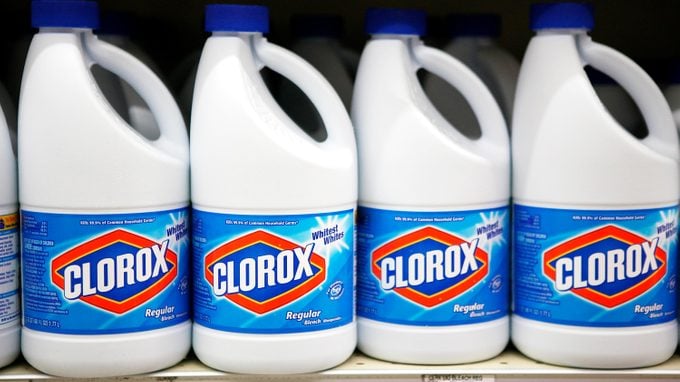Here’s Why Clorox Is So Good at Killing Germs
Updated: Dec. 21, 2022
Hint: It has to do with the smell, too.
Our editors and experts handpick every product we feature. We may earn a commission from your purchases.

It’s always obvious when someone’s just finished cleaning with Clorox. The smell is so distinctive that many people automatically think of one word when they get a whiff: clean. Although spreading germs is a part of life, and some germs are living in and on you that you couldn’t live without, you can avoid the unnecessary ones that spread disease with the help of cleaning products like Clorox. But how does it work? And can it kill the coronavirus?
So Why is Clorox Good at Killing Germs?
If Clorox Regular Bleach is your go-to cleaner, you’re probably wondering how and why it’s so good at disinfecting. Thank the main ingredient, bleach, for these antimicrobial properties, according to Travers Anderson, a research and development manager for Clorox. It’s is especially great for disinfecting because it’s an oxidant that attacks and breaks down the cell walls of microorganisms. “This mechanism is indiscriminate, meaning it will attack many different molecules that make up the cell walls of microorganisms,” Anderson says. “This allows it to work across a broad spectrum of organisms such as bacteria, viruses, and fungi.” Plus, this means these organisms can’t develop a resistance to Clorox Regular Bleach, according to Anderson. So yes, you should definitely use Clorox products to clean these little things everyone forgets to clean (but shouldn’t).
Is it Effective Against Coronavirus?
The ultimate test of a cleaning product’s mettle right now is whether it kills the coronavirus, COVID-19. And, sure enough, Clorox passes this test! “Several Clorox disinfecting products…have demonstrated effectiveness against viruses similar to COVID-19 on hard, non-porous surfaces,” a Clorox spokesperson tells Reader’s Digest. “Therefore, per the EPA’s Emerging Pathogen policy, they can be used against COVID-19 when used as directed.” More than 25 Clorox products make both the EPA’s list and American Chemistry Council’s Center for Biocide Chemistries’ (CBC) list of antimicrobial products to use against the virus. These products include Clorox Regular Bleach, Clorox Clean-Up Cleaner & Bleach Spray, and Clorox Disinfecting Wipes. And Clorox’s site also has a list of the approved products, plus more helpful information on the virus in general.
And What About That Smell?
So now you know how Clorox works, but what’s behind the smell? According to Anderson, that distinct Clorox scent is purposeful. “The smell of the bleach when you open the bottle is a way to know your bleach still has active cleaning agents,” he says. “This is especially helpful if you tend to have bottles stored in your home for a long time.” When you use it, the smell lets you know that the product is working to breakdown the germs on the surface, according to Anderson. Make sure you avoid these mistakes when cleaning with bleach.
Scrub, spray and wipe your way to a cleaner home with these top-rated cleaning products on Amazon.